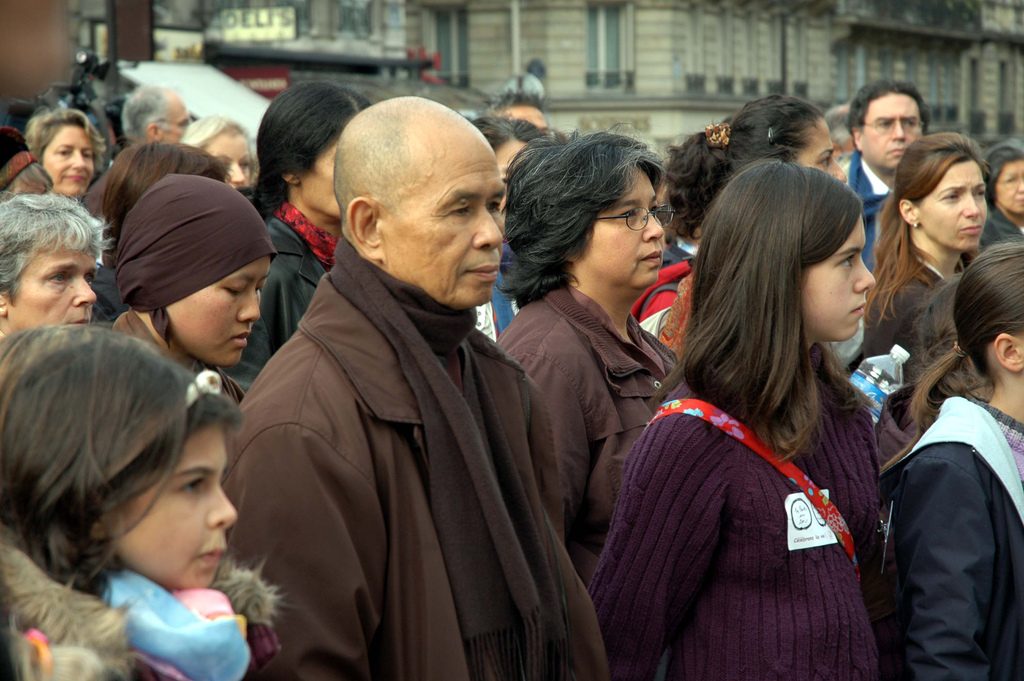When so many people die, we are shocked by it, and that shock can wake us up and it can help make awareness and mindfulness last. During this time, people are in a position where they have the capacity, and the opportunity, to look deeply into their situation and the situation around the world. That is why it is so important to make use of our suffering and not just complain about it. We have within us the seeds of despair, of anger, but we also have the seeds of compassion, awakening, Buddha-nature, and mindfulness. The teacher, the spiritual leaders, and the media play a very important role during this time. They can help water the seeds of wisdom and compassion, or they can continue to water the seeds of anger and fear—and that is what they are doing right now. America is getting angrier and more afraid every day because the negative seeds are being watered, and that is why we need people who have the capacity to water the good seeds. With calm and stability in us, we can perform an act of forgiveness that can bring down the level of suffering in this country and elsewhere.
Suffering has a role to play in opening our hearts by reminding us that everything is impermanent, that anything can happen to us at any time. It seems that America is dreaming, that America is not aware of what is going on within itself and outside. If we live in forgetfulness rather than in mindfulness—in a dream—we are creating violence without being aware of it. The way we live our daily lives and the way we consume creates a lot of suffering, a lot of injustice. We think it does not harm us, or others, but it can be very violent. The way we grow food and eat in America is violent. Forty thousand people die every day because of lack of food, and yet many people in America are overeating and they have to go to doctors in order to heal that. The forests are being cleared in order to make fields for cattle. When you look deeply into a piece of meat, you can see the flesh of the children who die every day; when you look into the glass of wine you are drinking, you can see the blood.
To me the definition of a Pure Land is not a place where people don’t suffer. I wouldn’t like to go to a place where there is no suffering, because I know that without suffering there is no way to cultivate understanding and compassion. When you suffer, you understand yourself. What happened in New York caused great suffering, but if we can learn from it, the suffering can become a bell of mindfulness in waking up the whole nation.
Many people who are angry pretend not to be angry, so we should not fool ourselves. I think in everyone there is the wisdom that violence will lead to violence. But anger and fear don’t allow that wisdom to come to light.
Of course we need action, but action based on fear and anger is always destructive. I would propose as the first action learning to be calm, learning the practice of mindful breathing, embracing the anger and the fear. And then, if we look deeply into the situation, we see that we are not the only people who suffer, and that we may have participated in creating others’ suffering. They may feel that they are victims of our discrimination, of our attempt to destroy them. So there may be wrong perceptions, and our duty is to tell them, “You must have suffered a lot to have done such a thing to us. So we want to understand why. We want to listen. In the past we have not been able to listen, but because we suffer, we want to listen to you.” That is to invite real dialogue.
I don’t think that the government understands the suffering even in this country. It is not a matter of blaming the government, but they have not been able to understand or listen deeply to the suffering inside and outside of the country. And the suffering comes from the fact that communication is blocked. Many suffer from injustice, from discrimination, and listening to them is the most effective way to change the politics that have led to this kind of violence. The whole nation, not just a group of people, should take up the practice of deep listening; it can be a collective practice of looking and listening deeply to our own suffering and the suffering outside. That is action. The other side will notice this effort to listen, not as politicians, but as human beings.
We must do everything we can to prevent such a thing from happening again, including locking up the people who are trying to do damage. But locking them up is not an act of punishment; it is only preventing destruction. We should lock people up with compassion, and we should try to talk to them and to water their seed of compassion, so they can wake up and then join us in the act of building more compassion. Killing them is not the way. By killing them, we create more of them.
Thank you for subscribing to Tricycle! As a nonprofit, we depend on readers like you to keep Buddhist teachings and practices widely available.
